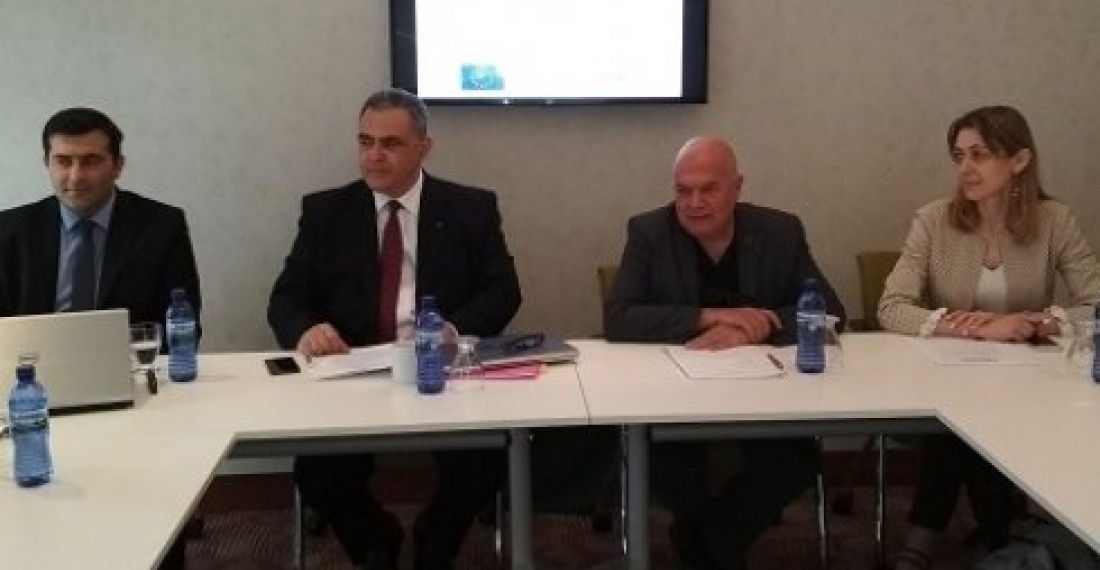Проблема наземных мин и неразорвавшихся боеприпасов на Южном Кавказе стала главной темой обсуждения круглого стола, который состоялся в Тбилиси во вторник, 16 октября 2018 года.
Представитель Армянского центра гуманитарного разминирования и экспертизы, г-н Рубен Аракелян (ACHDE); представитель Национального агентства по разминированию Азербайджана (ANAMA) Эльнур Касимов и представитель Государственного министерства примирения и гражданского равенства Грузии г-жа Тамуна Кохорадзе выступили с докладами на встрече, в которой также приняли участие представители международных организаций, включая ЕС и ООН, военные атташе и дипломаты, базирующиеся в Тбилиси, а также представители НПО и эксперты, занимающиеся этим вопросом.
Мероприятие было организовано LINKS («Диалог, анализ и исследования»), которое работает на Южном Кавказе с вопросами, связанными с конфликтами и мерами укрепления доверия, и регионального сотрудничества с 1997 года. Текущая работа LINKS по проблеме наземных мин и неразорвавшихся боеприпасов проводится в рамках EPNK, инициативы по миростроительству Европейского союза, которая осуществляется с 2010 года.
Выступая на встрече, директор LINKS (DAR) Деннис Саммут сказал, что в результате наземных мин и неразорвавшихся боеприпасов на Южном Кавказе за последние тридцать лет были убиты или ранены тысячи людей. Большую работу проделали национальные агентства по разминированию, такие как ACHDE и ANAMA, а также международные НПО, такие как HALO Trust. Он приветствовал сотни сотрудников этих организаций, которые ежедневно рискуют жизнью, пытаясь очистить регион от этой опасности. Проблема остро стоит в регионах, затронутых неразрешенными конфликтами, где политический контекст также является сложной проблемой. Он добавил, что Армения, Азербайджан и Грузия не подписали Оттавскую конвенцию о разминировании, несмотря на то, что все другие европейские страны, за исключением России, сделали это, и он призвал международное сообщество работать с тремя странами для изучения возможности того, чтобы они смогли сделать это одновременно в ближайшем будущем.
Деннис Саммут сказал, что необходимо усилить осознание этой серьезной гуманитарной проблемы как в регионе, так и за его пределами, и на встрече положительно оценивалась идея проведения в регионе "Международного дня осознания проблемы наземных мин и неразорвавшихся боеприпасов на Южном Кавказе", который пройдет в этом регионе в апреле 2019 года. Участники встречи высоко оценили усилия, направленные на искоренение проблемы наземных мин и неразорвавшихся боеприпасов на Южном Кавказе. Был также обсужден ряд практических предложений о том, как улучшить поток информации по этой теме. LINKS соберет еще одну встречу в этом формате в начале 2019 года.
источник: commonspace.eu
фото: Слева направо: Эльнур Касимов (ANAMA, Азербайджан), Деннис Саммут (LINKS), Рубен Аракелян (ACHDE, Армения) и Тамуна Кокорадзе (Государственное министерство гражданской интеграции Грузии, в ходе круглого стола по вопросам наземных мин и неразорвавшихся боеприпасов в Тбилиси, 16 октября 2018 года.







